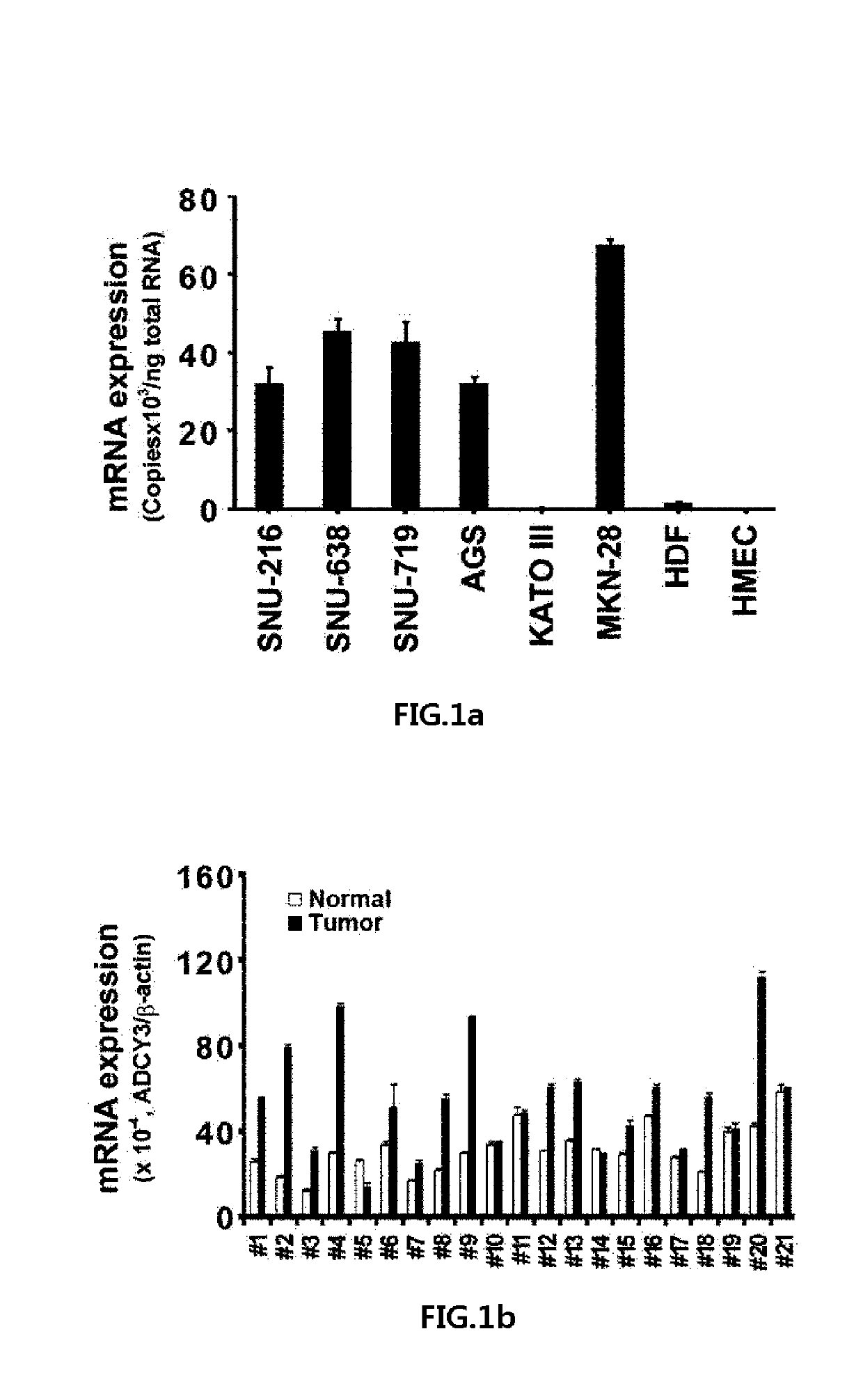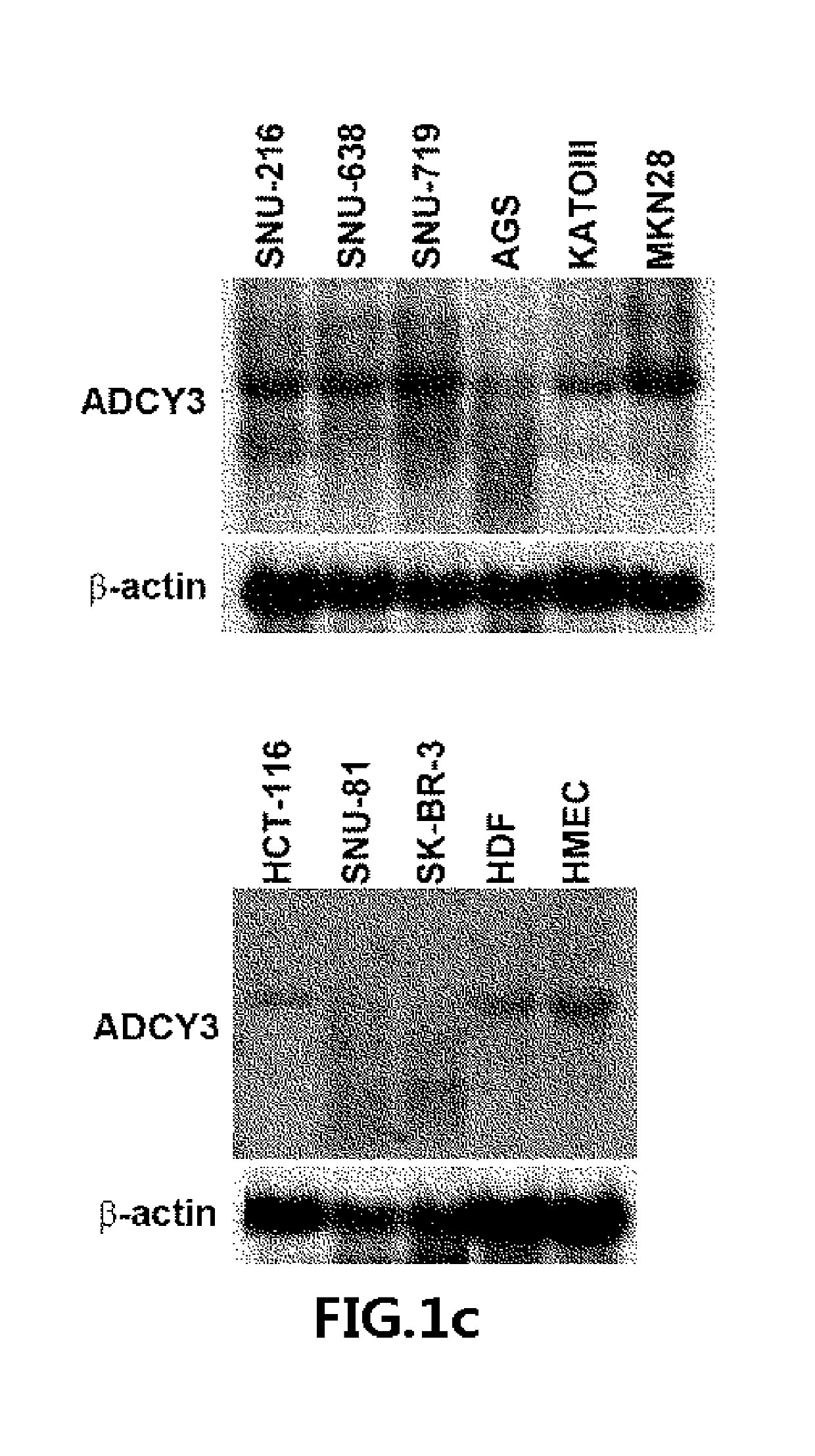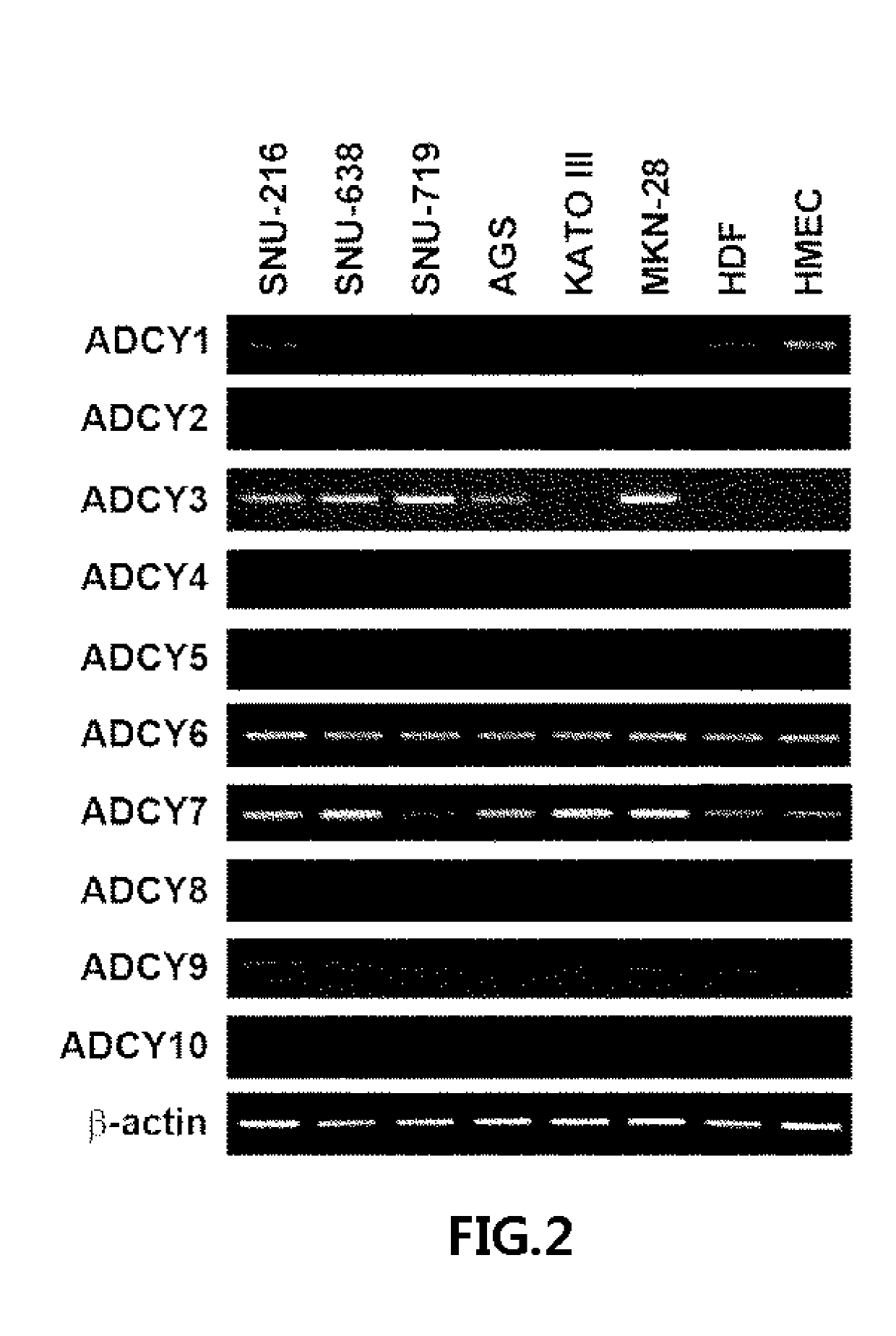Use of ADCY3 for diagnosis and treatment of gastric cancer
a technology of adenylate cyclase and gastric cancer, which is applied in the direction of lysates, instruments, drug compositions, etc., can solve the problems of increased disadvantageous in terms of hygiene, and potential discomfort or pain of patients under examination, so as to reduce the mortality of gastric cancer and high diagnostic sensitivity
- Summary
- Abstract
- Description
- Claims
- Application Information
AI Technical Summary
Benefits of technology
Problems solved by technology
Method used
Image
Examples
example 1
on of Cell and Tissue Samples
[0072]Human cancer cell lines (SNU-216, SNU-638, SNU-719-KCLB, Seuol, Korea; AGS, KATOIII, MKN28, HCT-116, SNU-81, SK-BT-3, Manassas, USA), human dermal fibroblast (HDF, obtained from ATCC), and HEK293 cells were cultured in growth media (Cellgro, USA) supplemented with 10% (v / v) fetal bovine serum and 1× penicillin-streptomycin (Invitrogen, USA). Human mammary epithelial cells (HMEC; Lonza, Switzerland) were cultured according to the manufacturer's instructions. Normal and gastric cancer tissue samples (Table 1) were obtained in accordance with the principles of the Declaration of Helsinki and were approved by the institutional review board of the National Cancer Center, Korea for human subject studies (Approval No. NCCNCS-08-127).
[0073]
TABLE 1No. of patients(%)A. Patient group for microarray (n = 27)No. of patientsMale20 (74.1%)Female 7 (25.9%)Total27Age at diagnosisRange44-78(years)Mean ± SD59.7 ± 11.2Disease stageT clasificationT117 (63.0%)T210 (37.0...
example 2
of mRNA Expression by RT-PCR, qRT-PCR and Northern Blotting
[0074]cDNA was synthesized from 2 μg of random primed total RNA from cultured cells using SuperScript™ III First-Strand Synthesis kit (Invitrogen). Also, human cDNA was obtained from the Human Multiple Tissue cDNA panel I (Clontech, USA) and Human Digestive System MTC panel (Clontech, USA). Primers for RT-PCR or qRT-PCR were designed using the internet site “Primer3 frodo.wi.mit.edu / primer3” to span two consecutive exons of each ADCY gene (Table 2).
[0075]
TABLE 2PrimerNameSequence (5′→3′)Sequence ListADCY1-FCCATCCCCAACTTCAATGACSEQ. ID. No. 2ADCY1-RAGGTGGGAGGAGATGGACTTSEQ. ID. No. 3ADCY2-FCCATGGTGGAGTTTGCTTTTSEQ. ID. No. 4ADCY2-RTGACAGTGTTGCCCCAGATASEQ. ID. No. 5ADCY3-FGAGTCACCCCCGATGTCAACSEQ. ID. No. 6ADCY3-RTTGCCCCAGATGTCGTAGTGSEQ. ID. No. 7ADCY4-FCTCTCCAAGCCCAAGTTCAGSEQ. ID. No. 8ADCY4-RACTACGGGTCCATGGTTCAASEQ. ID. No. 9ADCY5-FAGTGTGTGGCGGTCATGTTSEQ. ID. No. 10ADCY5-RCTGCCGATGGTCTTGATCTTSEQ. ID. No. 11ADCY6-FGAGGCAAACAATGAG...
example 3
t of Invasion by ADCY3-Dependent Cell Migration and Control
[0078]To overexpress ADCY3, HEK293 cells were transfected with pAcGFP1-ADCY3 vector, using Lipofectamine 2000 (Invitrogen), with the empty pAcGFP-C1 vector introduced as a negative control.
[0079]To silence the ADCY3 gene, 5×104 SNU-216 human gastric cancer cells were transfected with human ADCY3-specific siRNA (siADCY3: SI00058849 5′-ATGGAGCACCAGCTTCCTCAA-3′ SEQ ID NO:1) or negative control (NC) siRNA (Cat. No. 1027280; Qiagen) in a 6-well culture plate by using HiPerfect (Qiagen).
[0080]To evaluate the protein expression of ADCY3, Western blotting was performed using anti-ADCY3 (ab14778; Abcam, Cambridge, UK), anti-GFP (sc-9996, Santa Cruz Biotechnology, USA), anti-CREB, anti-p-CREB Ser133 (#8212, Cell Signaling Technology, USA), anti-β-actin, and anti-α-tubulin (Sigma-Aldrich, St. Louis, Mo., USA).
[0081]Cell migration was assayed by staining cells that had migrated downward through an 8-μm pore filter insert (BD, USA) durin...
PUM
| Property | Measurement | Unit |
|---|---|---|
| pH | aaaaa | aaaaa |
| pH | aaaaa | aaaaa |
| physical examination | aaaaa | aaaaa |
Abstract
Description
Claims
Application Information
 Login to View More
Login to View More - R&D
- Intellectual Property
- Life Sciences
- Materials
- Tech Scout
- Unparalleled Data Quality
- Higher Quality Content
- 60% Fewer Hallucinations
Browse by: Latest US Patents, China's latest patents, Technical Efficacy Thesaurus, Application Domain, Technology Topic, Popular Technical Reports.
© 2025 PatSnap. All rights reserved.Legal|Privacy policy|Modern Slavery Act Transparency Statement|Sitemap|About US| Contact US: help@patsnap.com



